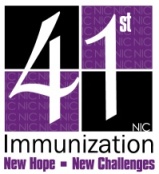
|
|
CDC NIP/NIC Home Page
|
Wednesday, March 7, 2007 - 4:35 PM
79
It Takes A Village: Ensuring Vaccine Compliance Among Children in Foster and Kinship Care
Everardo Aguilar1, Tania Farley2, Kathleen W. Gustafson2, and Adrienne Collins Yancey3. (1) San Diego Immunization Partnership, a UCSD contract with the SD County Immunization Branch, UC San Diego, 9500 Gilman Drive, #0720, La Jolla, CA, USA, (2) San Diego Immunization Partnership, a UCSD contract with the SD County Immunization Branch, County of San Diego Health and Human Services Agency, 9500 Gilman Drive # 0720, 3851 Rosecrans Street, La Jolla, CA, USA, (3) San Diego Immunization Branch, County of San Diego Health and Human Services Agency, PO Box 85222, Mail Stop P511B, 3851 Rosecrans Street, San Diego, CA, USA
Learning Objectives for this Presentation:
By the end of the presentation participants will be able to:
1. Appreciate the immunization and other health needs of foster and kinship care families in their communities
2. Provide culturally relevant information on immunizations and access to immunizations for these families
Background:
More than 500,000 children in the United States are estimated to be in foster care. An estimated 5 million children live with a caregiver who is not a parent but may be a family member or kinship provider not connected to the foster care system. This number is growing every year. Kinship providers are often elderly, low income and do not have insurance to cover the children in their care. In San Diego County, approximately one third of foster care children are Latino and primarily Spanish-speaking.
Setting:
San Diego County
Population:
Health educators and advocates serving foster and kinship care families
Project Description:
In coordination with foster and kinship care organizations, messages and materials were developed and offered at conferences, workshops, and information fairs to train foster and kinship care providers and to help them understand how to access immunization and other needed services. Additionally, Immunization Branch health educators worked with La Cuna, Inc., an agency placing Latino children in foster care homes. This alliance gave the Branch a unique opportunity to provide culturally appropriate education on immunizations to Latino foster care families.
Results/Lessons Learned:
1. Foster care and kinship care providers felt supported and were more aware of services available to them.
2. Providers were more aware of immunization and other health issues for children in kinship care, and could locate resources they might need.
3. Multiple agencies worked together to offer immunization and other health messages in a sensitive and culturally appropriate manner.
Web Page: www.sdiz.org